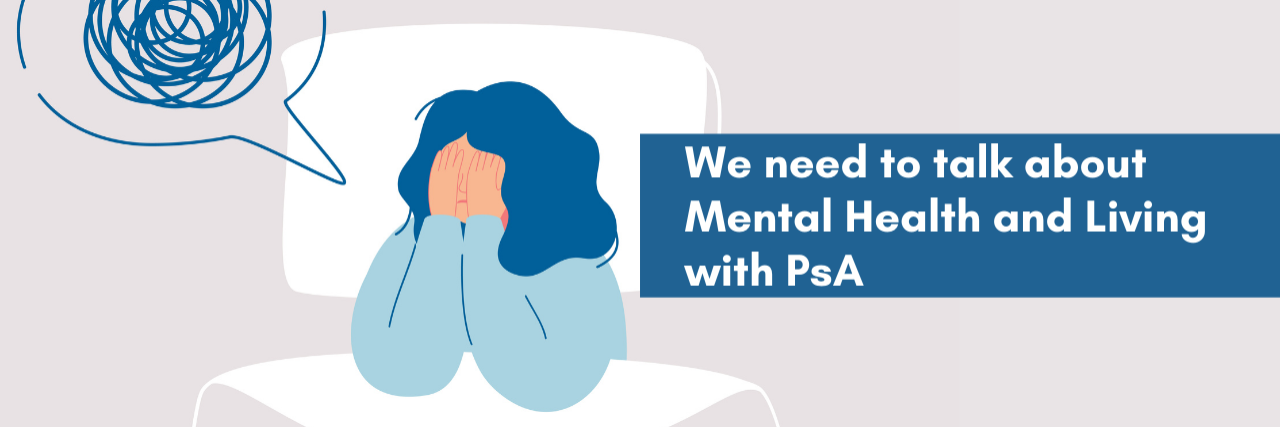We Need to Talk About Mental Health and Living With PsA
It started about six or seven years ago. I opened my eyes one Saturday morning, ready to participate in my volunteer childcare service for children with disabilities. I was the coordinator, responsible for scheduling the other volunteers and planning the activities for the day. I had gone to bed early, but when I woke up, I did not feel refreshed. I still felt tired. After four hours of playing with the kids, my body was worn out and ached all over. I realized I had been feeling sluggish for a while and stiff when first getting out of bed. Since I was entering middle age, I just chalked it up to getting older.
But the feelings of fatigue and pain started happening more frequently. I went to visit my primary doctor. He looked at my blood results and referred me to a rheumatologist. At this point in my life, I had already survived a rare childhood illness. Furthermore, I was living with diabetes, thyroid disease and major depression. I just couldn’t deal with any more sickness, so I never made an appointment with the rheumatologist. Later in the year, my father passed away. The emotional trauma triggered a severe flare-up of intense body pain with migraine headaches. Even my hair hurt, if that is possible! I finally decided to go to the rheumatologist and was diagnosed with psoriatic arthritis (PsA) and fibromyalgia. I immediately felt a rush of anxiety. How am I going to handle more medical issues? What will my future look like? Will I have to use a wheelchair? Will I need to be dependent on others? The fears consumed my thoughts. This did not help my mental health problems at all! Luckily, I had been seeing a mental health therapist for quite some time.
The therapist taught me about mindfulness meditation. This process trains your brain to focus on the current moment, rather than worry about the future. While listening to meditative sounds or music, let the thoughts come in, acknowledge them, but let them go, just like watching clouds pass in the sky. Concentrate on the sounds, rather than the thoughts. Do this for at least three minutes at a time or more, if time permits. I have been using this method for years and it has notably changed my thought process. It has limited my concerns for the future, allowing me to focus more on the present. I now live in the here and now, instead of obsessing about what might happen to me in the future.
Discovering I had PsA was quite life-changing. This illness impacts my activity level, social interactions, and how I manage my overall health. Because all social situations felt exhausting, I had to discontinue my volunteer service. Another challenge was learning how to pace my activities. If I did too many things in one day, I paid for it the next day! Lastly, PsA is a result of inflammation in the body. To decrease the inflammation, I had to adjust my diet.
These effects of PsA also affected my mental health. Interacting with others is essential in maintaining good mental health. However, participating in too many social events caused a flare-up of PsA, resulting in pain. What a vicious cycle! Second, having to pace my activities made me feel useless, since I could not do the same amount as others my age. Third, realizing I wasn’t eating healthy made me feel even more discouraged. Just when I was learning to manage my depression, I spun downward again. I felt so unworthy. All of this stress contributed to an even greater amount of pain and inflammation in my body.
My therapist pointed out that I had been hiding behind a mask of denial, even though it appeared I had accepted all of my illnesses. I needed to grieve all the feelings I tried to deny: anger toward not having a “normal” life, fear of the future and sadness for the struggles I had to overcome due to illness. She said that each time I am faced with a new diagnosis, the cycle of grief begins again. Therefore, it is difficult to reach acceptance of my chronic illnesses.
It took time, but I have adapted to the changes in my lifestyle. I now volunteer from home instead of at my church . I make handmade greeting cards that I donate to local hospitals and senior homes. Therefore, I can limit my physical activity, while still fulfilling my need to help others. I have also joined a Facebook support group, which allows me to interact with others. Additionally, I break down my chores during the week, rather than doing everything in one day. This gives my body time to rest in between tasks. Being able to complete daily tasks gives me confidence and purpose. Finally, I cook whole foods, rather than processed foods, to reduce the inflammation in my body. Less inflammation means more energy to socialize. All of these changes have helped me better manage my mental health.
In conclusion, by addressing my mental health and physical issues at the same time, I have established a more vibrant life. One must remember: our body systems are interconnected. When one system is out of balance, it creates instability in another system. We must address every aspect of our body to maintain good mental health while living with psoriatic arthritis.

